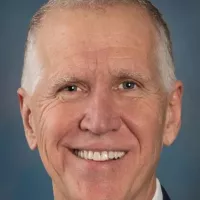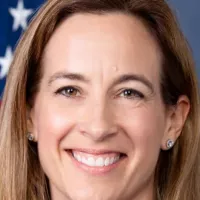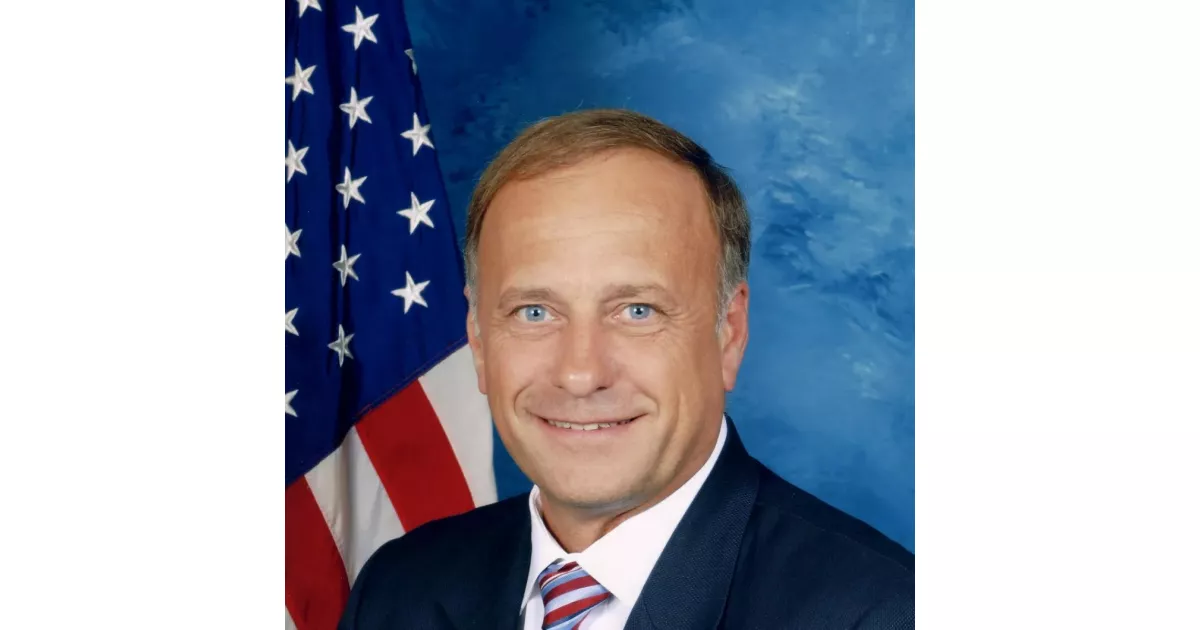Steven Arnold King is an American former politician known for his far-right views. He served as a U.S. representative from Iowa from 2003 to 2021. As a member of the Republican Party, King represented Iowa's 5th congressional district until its dissolution in 2013, thereafter serving the 4th congressional district until the end of his tenure. Throughout his political career, King was noted for his controversial statements and staunch conservative positions on issues such as immigration, which often sparked widespread debate and criticism. Despite his influence in conservative circles, his career faced challenges, including a loss of support from party leaders towards the end of his term due to his contentious remarks. Before his political career, King was involved in business, which contributed to his profile as a politician with a focus on economic and social issues.
May 28, 1949: Steven Arnold King born
Steven Arnold King was born on May 28, 1949, in Storm Lake, Iowa. This marks the birth of the American far-right former politician and businessman, who later served as a U.S. representative from Iowa.
1949: Steve King's birth year
Steve King was born in the year 1949 in Storm Lake, Iowa, which marks the beginning of his life and eventual political career.
1967: Attended Northwest Missouri State University
In 1967, Steve King began his higher education journey by attending Northwest Missouri State University. This marked the start of his college education.
1967: Graduated from high school
Steve King graduated from Denison Community High School in 1967, marking the completion of his secondary education.
1970: Left Northwest Missouri State University
In 1970, Steve King left Northwest Missouri State University. Although he did not graduate, his time there contributed to his early education and career foundation.
1970: Ended university education
Steve King left Northwest Missouri State University in 1970 without completing his degree. This marked the end of his formal education and the beginning of his focus on business.
1972: Marriage to Marilyn Kelly
In 1972, Steve King married Marilyn Kelly. This event marked a significant personal milestone and the beginning of his family life, with whom he later had three children.
1975: Founded King Construction
In 1975, Steve King founded King Construction, an earthmoving company. This venture marked a significant step in his entrepreneurial career before entering politics.
1975: Founded construction company
In 1975, Steve King founded a construction company, marking his foray into the business world. This venture was a significant step in his career before entering politics.
1986: Democrat's Close Race in 1986
In 1986, Democrat Berkley Bedell nearly won in what was then the 6th District, marking a rare close race for Democrats in this area. Republican Fred Grandy won by a narrow margin, securing 50.1% of the vote. This year marked a significant challenge to Republican dominance in the district.
1993: Redistricting Changes in 1993
The district underwent redistricting in 1993, transitioning from the 6th to the 5th District. This change was part of the broader redistricting efforts across the state during this period.
1995: Tom Latham's tenure in reconfigured district
In 1995, Tom Latham began representing what would become the reconfigured 4th district. This historical context highlights the changes leading up to Steve King's representation post-2010 census.
1996: Elected to Iowa Senate
In 1996, Steve King was elected to Iowa's 6th Senate district, marking the start of his political career. He defeated incumbent Wayne Bennett in the primary and won the general election against Eileen Heiden.
2000: Reelected to Iowa Senate
In 2000, Steve King was reelected to the Iowa Senate, securing his position for a second term. This reaffirmed his political standing in Iowa.
2002: Elected to U.S. House of Representatives
In 2002, Steve King was elected to the U.S. House of Representatives after winning the Republican primary and general election. This marked his transition from state to national politics.
2002: King Wins Republican Nomination
In 2002, Steve King won the Republican nomination, positioning himself as an outspoken fiscal and social conservative. He aimed to shift the political center to the right during his tenure.
2003: Began tenure as U.S. Representative
In 2003, Steve King began serving as a U.S. Representative from Iowa. He represented Iowa's 5th congressional district until 2013, marking the start of his lengthy career in the U.S. House of Representatives.
2003: Latham's earlier representation
In 2003, before redistricting, Tom Latham represented areas that would later become part of Steve King's 4th district. This overlap influenced the political dynamics King would face later.
May 2004: Steve King compares Abu Ghraib abuse to hazing
In May 2004, Steve King compared the Abu Ghraib prison abuse scandal to "hazing," downplaying the severity of the incidents and sparking controversy for his remarks on the treatment of prisoners.
2005: Vote Against Hurricane Katrina Relief
In 2005, Steve King was one of 11 Congress members to vote against the $51.8 billion Hurricane Katrina relief package, citing a lack of a comprehensive spending plan. This decision was controversial given the widespread support for the relief effort.
April 2006: King dismisses need for illegal immigrant labor
In April 2006, Steve King rejected the notion that the U.S. economy depended on illegal immigrants, suggesting better utilization of American workers and technology could replace them.
2006: Reelection to third term
In 2006, Steve King was reelected to a third term in the U.S. House of Representatives, defeating opponent Schulte. He continued to represent his district effectively, demonstrating his political strength.
2007: Vote Against Animal Transport Penalties
In 2007, Steve King was one of 39 House members to vote against increasing penalties for transporting fighting animals across state lines, reflecting his controversial stance on animal welfare issues.
March 7, 2008: Steve King comments on Barack Obama's middle name
On March 7, 2008, during his reelection campaign announcement, Steve King made remarks about Barack Obama's middle name "Hussein," which were perceived as controversial and indicative of his stance during that period.
January 2009: Steve King criticizes Obama using middle name at inauguration
In January 2009, Steve King criticized Barack Obama's decision to use his middle name "Hussein" during his presidential inauguration, calling it "bizarre" and a "double standard." This reflected his ongoing critical stance towards Obama during that period.
April 3, 2009: Iowa Supreme Court rules on same-sex marriage
On April 3, 2009, the Iowa Supreme Court ruled that banning same-sex marriage was unconstitutional. Steve King opposed this and campaigned against the justices involved, leading to their non-retention.
2009: Opposition to American Recovery and Reinvestment Act
In 2009, Steve King voted against The American Recovery and Reinvestment Act, criticizing it for taxpayer-funded subsidies and bureaucracy. He argued the economy would recover through increased production rather than government spending.
February 2010: Raccoon Incident
In February 2010, Steve King tweeted about shooting a raccoon that tried to enter his house during a blizzard, leading to criticism from animal rights groups. He defended his actions by suggesting the raccoon might have been rabid, sparking controversy over his approach to the incident.
February 26, 2010: King supports lobbyists' role in healthcare debate
On February 26, 2010, Steve King defended lobbyists during a debate on health care reform, emphasizing their role in providing valuable information.
June 14, 2010: Steve King defends racial profiling in law enforcement
On June 14, 2010, Steve King defended the use of racial profiling in law enforcement during a speech on the House floor, stating it as a necessary component of legitimate law enforcement. His comments sparked controversy and were an example of his polarizing views on race and policing.
September 24, 2010: Colbert Testifies to Congress
On September 24, 2010, comedian Stephen Colbert testified before the House Agriculture Committee about migrant farmworkers' conditions, mocking Steve King's statements. King promoted replacing migrant workers with 'everyday American workers' and criticized those who watch Comedy Central.
2010: Redistricting after 2010 Census
Following the 2010 Census, Iowa lost a congressional district, leading to redistricting. Steve King's district became the 4th and included new areas like Mason City and Ames. This significant change in his political landscape posed new challenges for King.
2010: Steve King speculates on Obama's immigration policies
In 2010, Steve King speculated that President Obama's immigration policies were influenced by racial favoritism towards black people, adding to his history of controversial statements regarding race and policy.
July 2012: Controversial Farm Bill Amendment
In July 2012, Steve King introduced an amendment to the House Farm Bill that sought to legalize certain banned animal agriculture practices. The amendment faced criticism from the Humane Society, which argued it could undermine laws protecting animals and public safety.
July 2012: Opposition to Animal Fighting Penalties
In July 2012, Steve King opposed the McGovern Amendment, which sought to establish penalties for participating in organized animal fights. His stance was criticized by animal rights groups and featured on The Colbert Report, highlighting controversial views on animal welfare.
August 19, 2012: Defense of Todd Akin's Controversial Remarks
On August 19, 2012, Steve King defended Todd Akin after his controversial 'legitimate rape' comments, calling the criticism against Akin 'petty personal attacks'. King's defense was later viewed as politically damaging, particularly by conservative groups seeking viable candidates.
2012: Steve King's Close Race in 2012
In 2012, Steve King faced a tough election against Vilsack, marking one of the few instances since 1986 where a Republican didn't win the district by double digits. This election highlighted competitive political dynamics in the district.
2012: Reelection to sixth term
In 2012, Steve King was reelected to a sixth term in Congress, defeating Christie Vilsack. This victory highlighted his strong political position despite facing significant opposition and challenges.
May 3, 2013: Announced not running for U.S. Senate
On May 3, 2013, Steve King announced his decision not to run for the U.S. Senate in 2014. This decision shaped his political focus and trajectory.
May 2013: Introduction of Protect Interstate Commerce Act
In May 2013, Steve King introduced the Protect Interstate Commerce Act as part of the House Farm Bill, aiming to prevent states from imposing restrictions like 'free range' labeling. The provision was controversial and was eventually dropped in 2014.
July 2013: King's controversial remarks on illegal immigrants
In July 2013, Steve King made controversial remarks about illegal immigrants, claiming many were drug mules. His comments were widely criticized by both Democrats and Republicans.
2013: Redistricted to Iowa’s 4th congressional district
In 2013, after the redistricting process, Steve King began representing Iowa's 4th congressional district instead of the 5th. This change was due to the 2010 census adjustments.
2013: District Renaming in 2013
In 2013, what was previously known as the 5th District was renamed as the 4th District. This renaming marked another phase in the district's political evolution and history.
September 2014: Steve King calls for mosque surveillance
In September 2014, Steve King advocated for the surveillance of mosques to monitor ISIS recruitment, despite a lack of evidence. This call for surveillance added to his controversial positions on national security and religious freedom.
October 7, 2014: King inducted into Human Rights Campaign's 'Hall of Shame'
On October 7, 2014, Steve King was inducted into the Human Rights Campaign's 'Hall of Shame' due to his opposition to LGBT equality.
2014: Decision impacted 2014 Senate race
In 2014, Steve King's decision not to run for the U.S. Senate influenced the political field for that election cycle, impacting his career and political strategy.
2014: Controversial Provision Dropped
In 2014, the controversial Protect Interstate Commerce Act provision, introduced by Steve King, was dropped from the House Farm Bill. The provision faced criticism for its potential impact on state regulations regarding agriculture.
July 2015: King's remarks on Hispanic identity questioned
In July 2015, Steve King controversially claimed to be as Hispanic as HUD Secretary Julián Castro, despite having no Hispanic or Latino background, prompting criticism.
August 2015: King Named Least Effective Member
In August 2015, InsideGov named Steve King the least effective member of Congress, citing his inability to move legislation out of committee. This label highlighted challenges in his legislative effectiveness.
December 9, 2015: Steve King declares Islam incompatible with American life
On December 9, 2015, Steve King stated on MSNBC that Islam is "incompatible" with American life, adding to his portfolio of controversial statements on religion and cultural integration.
2015: Steve King introduces bill on affirmative action reporting
In 2015, Steve King introduced a bill requiring colleges to report affirmative action practices, reflecting his opposition to affirmative action policies and highlighting his stance on racial and gender equality in education.
July 18, 2016: Steve King's remarks on Western civilization and race
On July 18, 2016, during an MSNBC panel, Steve King made remarks suggesting that Western civilization, often linked to Caucasian contributions, is a superior culture. His comments were criticized as overtly racist, highlighting his contentious views on race and history.
2016: Endorsement of Ted Cruz and Donald Trump
In 2016, Steve King endorsed Ted Cruz during the Republican presidential primaries, describing him as 'the answer to my prayers'. After Cruz's defeat, King strongly supported Donald Trump, aligning himself with the eventual nominee.
2016: Steve King displays Confederate flag and opposes Tubman on $20 bill
In 2016, Steve King faced criticism for displaying a Confederate flag on his desk, which he removed following a tragic shooting involving a Confederate flag supporter. He also attempted to block a bill to replace Andrew Jackson with Harriet Tubman on the $20 bill, showing his stance on historical symbols. Additionally, King expressed agreement with Bernie Sanders on immigration views, highlighting his complex political positions in 2016.
2016: Comparison with 2016 election turnout
The 2016 election saw higher voter turnout compared to 2018, with 370,259 voters participating. This comparison reflects the political environment and challenges Steve King faced in maintaining support.
January 2017: King critiques Obamacare after 2016 presidential election
In January 2017, following the 2016 presidential election, Steve King called for the repeal of Obamacare, labeling it unconstitutional and egregious.
March 12, 2017: Steve King supports Geert Wilders with controversial statements
On March 12, 2017, Steve King openly expressed his support for Geert Wilders, a Dutch far-right politician, with controversial remarks about culture and demographics. His statements, suggesting the need for cultural homogeneity and criticizing birthright citizenship, drew criticism from various politicians, including Republicans like Jeb Bush. Despite backlash, King defended his views, which found favor among white nationalists. The incident highlighted King's contentious stance on immigration and cultural identity.
March 2017: Controversial comments by Steve King on culture and demographics
In March 2017, Steve King made controversial remarks about culture and demographics, suggesting that the U.S. can't restore its civilization with "somebody else's babies" and advocating for a homogenous America. His comments were criticized by members of his own party, including Speaker Paul Ryan, but were praised by white supremacist David Duke, reflecting the divisive nature of his statements in March 2017.
May 2017: King changes stance on American Health Care Act
In May 2017, Steve King shifted his support for the American Health Care Act due to added benefits like emergency services, expressing concerns about its effectiveness in the Senate.
July 2017: Steve King calls for additional funding for US-Mexico border wall
In July 2017, following the House Appropriations Committee's vote to fund the US-Mexico border wall, Steve King advocated for an additional $5 billion, suggesting that funds should be redirected from Planned Parenthood, food stamps, and welfare programs. This stance highlighted his approach to immigration and welfare policies in July 2017.
December 8, 2017: Steve King supports Viktor Orbán's views on diversity
On December 8, 2017, Steve King tweeted his support for Hungarian Prime Minister Viktor Orbán's statement that 'Diversity is not our strength.' King echoed Orbán's views on assimilation and criticized the multicultural left, emphasizing his belief that assimilation is America's strength, not diversity. This event further illustrated King's alignment with right-wing populist views during the European migrant crisis.
2017: King opposes stricter regulations on gun ownership
In 2017, Steve King opposed a bill intended to close the 'gun show loophole' and enhance background checks for gun show purchases, stating it would ruin 'Christmas at the Kings'.
January 13, 2018: Steve King's tweet on racial oppression
On January 13, 2018, Steve King tweeted that racial oppression was a "thing of the past," contributing to his record of controversial remarks on race and equality in the U.S.
August 24, 2018: Interview with Austrian far-right publication
On August 24, 2018, Steve King was interviewed by Austrian website Unzensuriert, associated with the far-right Freedom Party. During the interview, King agreed with conspiracy theories involving George Soros and the 'Great Replacement,' a far-right idea about replacing white populations with minorities. This interview contributed to King's controversial reputation and connections with far-right ideologies.
October 2018: ADL calls for censure following Pittsburgh synagogue shooting
In October 2018, following the Pittsburgh synagogue shooting, the Anti-Defamation League sent a letter to House Speaker Paul Ryan urging him to censure Steve King. The ADL cited King's associations with far-right groups and antisemitic remarks, particularly his comments about George Soros. The letter accused King of dishonoring the House of Representatives and called for formal disciplinary actions against him.
October 2018: NRCC condemns King for racism
In October 2018, the NRCC condemned Steve King for racist remarks, leading to a lack of support in his re-election efforts. Prominent Republicans criticized his comments as inappropriate and divisive.
November 5, 2018: Steve King's controversial comment about Mexican immigrants
On November 5, 2018, Steve King was reported to have referred to Mexican immigrants as "dirt" during a campaign stop. Although he denied the claim, The Weekly Standard released audio confirming his remarks, adding to his history of controversial comments.
2018: King criticizes Parkland survivor and comments on gun violence
In 2018, Steve King criticized Parkland shooting survivor X González, associating González with Communist Cuba. He argued that gun violence was due to factors like video games and family break-ups, rather than gun accessibility.
2018: Controversies around white nationalism affiliations
In 2018, Steve King faced significant controversies due to his affiliations with white nationalism. The Washington Post described him as the most openly affiliated Congressman with white nationalist ideologies. This year marked a peak in criticisms against him for his controversial statements and actions.
2018: Narrow reelection victory in 2018
In the 2018 election, Steve King faced his closest race yet, narrowly defeating Democratic nominee J. D. Scholten with 50.4% of the vote. This election highlighted decreasing support for King, influenced by broader political dynamics.
January 14, 2019: Removal from Committee Assignments
On January 14, 2019, Steve King was removed from his committee assignments, including the Judiciary, Agriculture, and Small Business Committees, after facing bipartisan condemnation for his remarks on white supremacy.
January 2019: King's remarks on white supremacy condemned
In January 2019, Steve King faced backlash for remarks questioning why the terms 'white nationalist' and 'white supremacist' were offensive. The House voted overwhelmingly to rebuke him, with widespread condemnation from both parties.
January 2019: Removed from House committee assignments
In January 2019, Steve King was removed from all House committee assignments after questioning the negative connotations of 'white nationalist' and 'white supremacy' in an interview. This action followed widespread condemnation from both political parties and the public.
March 7, 2019: Steve King votes 'present' on anti-discrimination resolution
On March 7, 2019, Steve King voted "present" rather than supporting a House resolution condemning anti-Semitism and anti-Muslim discrimination, reflecting his contentious stance on issues of discrimination and religious tolerance.
May 2019: Steve King makes comments on cultural equality
In May 2019, Steve King warned against assuming that all cultures are equal, continuing his pattern of making divisive and controversial statements regarding cultural and immigration issues.
May 17, 2019: King votes against the Equality Act
On May 17, 2019, Steve King was one of 173 representatives to vote against the Equality Act, which aimed to prevent discrimination based on sexual orientation and gender identity.
August 2019: Controversial Comments on Abortion
In August 2019, Steve King faced widespread criticism for his remarks on abortion in cases of rape or incest. The comments were condemned by various political figures, including Liz Cheney, who called for his resignation. The backlash highlighted ongoing controversies surrounding his views.
August 27, 2019: Steve King jokes about Uyghur Muslims in internment camps
On August 27, 2019, Steve King made a controversial joke about Uyghur Muslims being forced to eat pork in China's internment camps, furthering his record of insensitivity and controversial remarks regarding human rights issues.
September 4, 2019: Steve King posts video from migrant facilities
On September 4, 2019, Steve King posted a video of himself drinking from water fountains over toilets at migrant facilities, prompting criticism from Congresswoman Alexandria Ocasio-Cortez, who labeled the GOP as "anti-immigrant" following the video release.
December 18, 2019: Steve King's Vote Against Impeachment
On December 18, 2019, Steve King voted against both articles of impeachment against President Trump. He was part of the unanimous Republican opposition in this vote, reflecting party loyalty during a critical political moment.
February 2020: Steve King insinuates Philip Haney's death was a murder
In February 2020, Steve King suggested on Twitter that the death of former DHS official Philip Haney was a murder in retaliation for incriminating data against the Obama administration, continuing his trend of making controversial and unverified claims.
June 2020: Lost Republican primary
In June 2020, Steve King lost the Republican primary to Randy Feenstra by 10 points. This defeat ended his bid for reelection and marked the decline of his political support and influence.
December 2020: Support for Texas v. Pennsylvania
In December 2020, Steve King was among 126 Republican House members who signed an amicus brief supporting the Texas v. Pennsylvania lawsuit, which challenged the 2020 presidential election results. The Supreme Court declined the case, citing Texas's lack of standing.
2020: King votes against Further Consolidated Appropriations Act
In 2020, Steve King voted against the Further Consolidated Appropriations Act, which included provisions to nearly double available H-2B visas.
2020: Defeat in 2020 Republican Primary
In 2020, Steve King was defeated in the Republican primary by Randy Feenstra, marking a significant political setback and the end of his tenure. This defeat followed controversies that had surrounded his career in recent years.
2021: End of congressional service
Steve King's tenure as a U.S. Representative came to an end in 2021. He had served in Congress from 2003, representing Iowa's 5th and later the 4th congressional districts.
August 2023: Steve King opposes carbon-capture pipelines
In August 2023, Steve King campaigned against carbon-capture pipelines at an event co-hosted by the John Birch Society. He criticized the use of eminent domain for these projects and highlighted financial motivations as a concern. This advocacy positioned King against certain environmental initiatives, emphasizing his stance on property rights and economic interests.
Mentioned in this timeline

Donald John Trump is an American politician media personality and...

Bernie Sanders is a prominent American politician currently serving as...

George Soros is a Hungarian-American investor and philanthropist with a...

Alexandria Ocasio-Cortez AOC is a prominent American politician and activist...

Barack Obama the th U S President - was the...

Stephen Colbert is an American comedian writer producer political commentator...
Trending
4 months ago Micron's surge in 2025: Morgan Stanley predicts even greater gains; Cramer bullish.

Thom Tillis is the senior U S Senator from North Carolina serving since A Republican he previously served in the...

3 months ago Upstart's Q3 Earnings: Mixed Results, Soft Q4 Guidance, and Stock Slides After Announcement.

2 months ago Sherrill Considers Action Against Trump, NJ Mulls Federal Tax Halt.
2 months ago Strategy's Dollar Reserve for Bitcoin Fails Amidst Sales Concern and Market Slump

3 months ago Grigor Dimitrov Returns to Tennis at Paris Masters After Wimbledon Retirement
Popular

Thomas Douglas Homan is an American law enforcement officer who...

Martin Luther King Jr was a pivotal leader in the...

XXXTentacion born Jahseh Dwayne Ricardo Onfroy was a controversial yet...

William Franklin Graham III commonly known as Franklin Graham is...
Matt and Ross Duffer known as the Duffer Brothers are...

Instagram is a photo and video-sharing social networking service owned...
